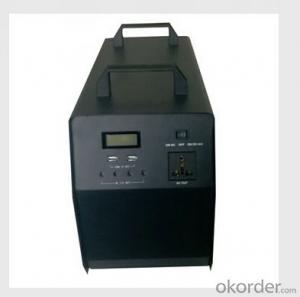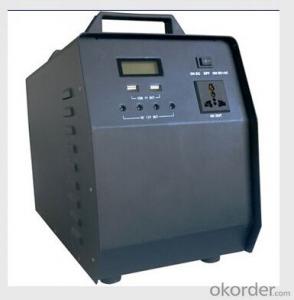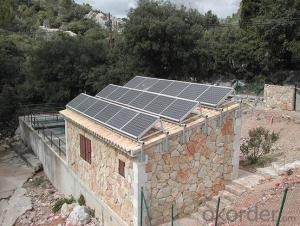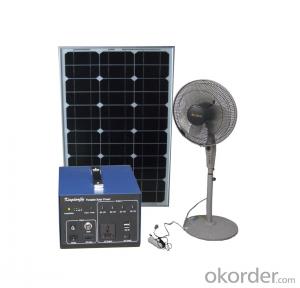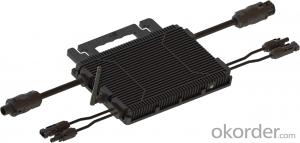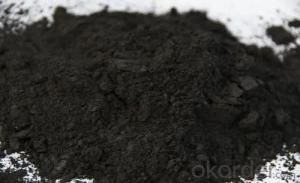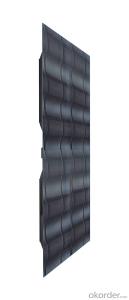Solar Home System Small Solar System 500W
- Loading Port:
- Shanghai
- Payment Terms:
- TT or LC
- Min Order Qty:
- 10000 set
- Supply Capability:
- 5000000 set/month
OKorder Service Pledge
OKorder Financial Service
You Might Also Like
Introduction of Solar Home System
Solar Home System is composed by Solar Panels, Inverters, Charger Controller, Battery, Cable, Mounting Bracket, which is applied to produce electricity for home use.
Solar Home System is quite suitable product in urban area and the place which is short of electricity. As the cost of solar products reduced, more and more family can bear the charge of solar products. These products apply to schools, hospitals, public halls and private housing, communication stations, weather station. Also can use as household appliances, lighting, communications equipment, meteorological equipment.
Our company’s main target is to make every family can use cheap solar energy and enjoy the new innovation of modern science and technology.
Picture of Our Factory

Working Principle of Solar Home System
This is an off-grid solar system which uses batteries to store the solar energy, at the same time, the solar system can be connected with the grid for utilization of grid power. The solar system uses battery power in priority, but when sunshine is not so good or loads consumption is too big which caused the battery power inadequacy, then the system can switch automatically to grid power supply. Meanwhile, the system can charge the batteries with grid power until batteries are fully charged. Then the solar system will switch back to battery power supply.
Product Details of Solar Home System
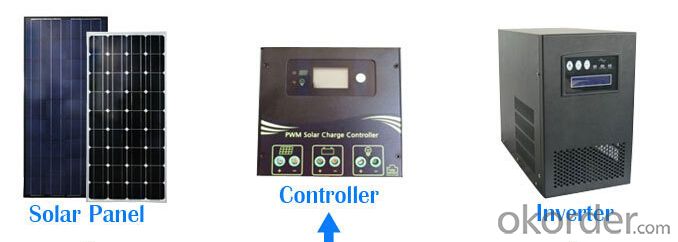
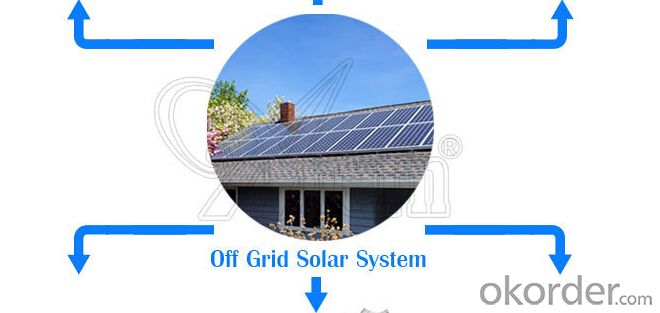

Working Principle of Solar Home System
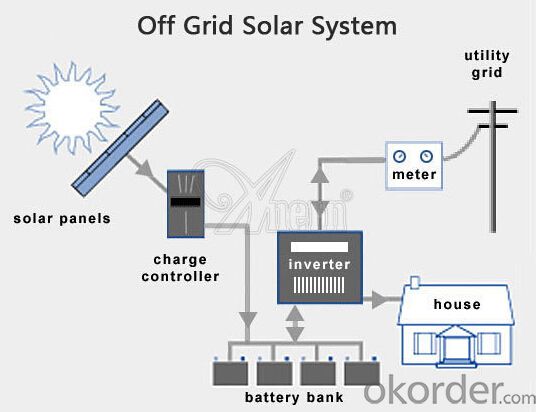
Specification of Solar Home System
Technical data: | |||||||||
Inverter | Rated load power | 500W | |||||||
Output wave | modify sine wave | ||||||||
Input voltage | 12V | ||||||||
Output voltage | DC:12V | ||||||||
Output frequency | 50HZ/60HZ | ||||||||
Precision of output frequency | ±6% | ||||||||
Solar panel | Pmax | 60W | |||||||
Vmp | 17.5V | ||||||||
Imp | 3.429A | ||||||||
Charger | Charger voltage & current | 12V10A | |||||||
Battery | Capacity | 12V38AH | |||||||
Power box | Spray paint iron box, input, output, ammeter, voltmeter, master switch and so on | ||||||||
Package data: | |||||||||
Part | Size (L*W*H mm) | Weight (kg) | 20' (pcs) | 40' (pcs) | |||||
Power box | 520*220*430 | 35 | 140Sets | 320Sets | |||||
Solar panel | 790*700*50 | 7 | |||||||
Solar panel bracket |
|
| |||||||
Loading electrical equipment(For consult) | |||||||||
Name of Load | Power(W) | Quantity | Working Time per Day (H) | Working Days | |||||
Color TV | 65W | 1 | 1 | 2 days | |||||
Satellite TV Receivers | 25W | 1 | 1 | 2 days | |||||
lamp | 11W | 2 | 6 | 2 days | |||||
Other | 150W |
| 1 | 2 days | |||||
Advantage of Our Solar Home System
1 Excellent Performance: Our Solar Home System is composed by Brand Standard Kits with high quality. Our solar system has the advantage of high efficiency and stable operation. We can ensure our product with a long life period.
2. Small Orders Accepted: We can accept small orders as our customer’s trial order.
3. Guarantee/Warranty: We supply 10 Years Product Warranty and 25 Years Performance warranty.
4. Warehouse: We have warehouse overseas which can bring great convenience to our customer to pick up the products.
- Q:Can solar energy systems be used to power boats or yachts?
- Yes, solar energy systems can indeed be used to power boats or yachts. Solar panels can be installed on the roof or deck of a boat to capture sunlight and convert it into electricity. This electricity can then be used to power various onboard systems, such as lights, navigation equipment, communication devices, refrigeration, and even propulsion systems. The size and capacity of the solar energy system will depend on the specific power requirements of the boat or yacht, as well as the available space for installation. Solar-powered boats and yachts offer several advantages, including reduced reliance on fossil fuels, lower operational costs, quieter operation, and reduced carbon emissions. However, it is important to note that solar energy alone may not be sufficient to power larger vessels or during prolonged periods of low sunlight. In such cases, a hybrid system that combines solar energy with other power sources, such as wind or diesel generators, may be more suitable.
- Q:Can a solar energy system be installed in areas with low sunlight?
- Yes, a solar energy system can be installed in areas with low sunlight. While it is true that solar panels generate more electricity in areas with high sunlight exposure, they can still function and provide a certain amount of energy in areas with lower sunlight. Additionally, advancements in solar technology have improved the efficiency of panels, allowing them to generate electricity even in cloudy or overcast conditions. It is important to assess the specific conditions and available sunlight in a particular area before installing a solar energy system to ensure optimal performance and energy production.
- Q:Can solar energy systems be used for powering off-grid eco-lodges?
- Yes, solar energy systems can definitely be used for powering off-grid eco-lodges. Solar panels can be installed on the roofs of these lodges to capture sunlight and convert it into electricity. This renewable energy source can be stored in batteries to provide power during periods of low sunlight or at night. By harnessing solar energy, off-grid eco-lodges can greatly reduce their reliance on fossil fuels and minimize their environmental impact.
- Q:Can solar energy systems be used in powering construction sites or temporary structures?
- Yes, solar energy systems can definitely be used to power construction sites or temporary structures. Solar panels can be installed on rooftops or mounted on the ground to harness sunlight and convert it into electricity. This renewable energy source can provide a reliable and sustainable power supply for various construction activities, including lighting, equipment operation, and temporary office setups. Additionally, solar energy systems can be easily transported and set up at different locations, making them ideal for powering temporary structures, such as mobile offices or worker accommodation.
- Q:I want to install a full set of domestic solar heating equipment does not know how much money to spend, please.
- According to the annual use of 280 square meters of construction area of the average daily consumption of 11 square meters, energy saving rate of more than 50% of the total energy consumption of more than 11 square meters. Cost: 38000 yuan (excluding heating part); system design life: 20 years; saving ratio: 280 square housing annual use of wall mounted gas boiler is about 3000 cubic meters of natural gas per cubic, an average of 2.2 yuan, a total of 6600 yuan.
- Q:How does the tilt angle of solar panels affect energy production?
- The tilt angle of solar panels plays a crucial role in determining the energy production efficiency. The tilt angle refers to the angle at which the solar panels are inclined relative to the horizontal plane. This angle is typically adjustable to optimize energy generation based on the geographical location and time of the year. The primary impact of the tilt angle is on the amount of solar radiation that the solar panels receive. By tilting the panels at an optimal angle, they can capture the maximum amount of sunlight throughout the day. In general, the optimal tilt angle for solar panels is equal to the latitude of the location to maximize the annual energy yield. During the summer months, when the sun is higher in the sky, a smaller tilt angle is preferred to capture the more direct sunlight. On the other hand, during the winter months, when the sun is lower in the sky, a steeper tilt angle is necessary to capture the sunlight falling at a lower angle. Adjusting the tilt angle throughout the year helps ensure that the solar panels receive sunlight at the most favorable angle, maximizing energy production. Solar panels that are not tilted at the optimal angle may receive sunlight at a less efficient angle, resulting in lower energy generation. If the panels are tilted too steeply or too shallowly, they may not capture the maximum amount of solar radiation, reducing their overall energy production potential. Moreover, the tilt angle also affects the self-cleaning ability of solar panels. By tilting the panels at an angle, rainwater can wash away dust, debris, and other particles that may accumulate on the surface. This self-cleaning mechanism helps maintain higher energy production levels by keeping the panels clean and free from obstructions. In conclusion, the tilt angle of solar panels has a significant impact on energy production. Adjusting the tilt angle optimally allows for better capture of solar radiation, maximizing energy generation. By considering the geographical location and seasonal variations, solar panel owners can ensure their panels are positioned optimally for increased energy production efficiency.
- Q:Can solar energy systems be used for powering off-grid eco-commercial complexes?
- Yes, solar energy systems can definitely be used for powering off-grid eco-commercial complexes. Solar panels can be installed on the rooftops or open spaces of these complexes to generate clean and renewable energy. This energy can then be stored in batteries for use during non-sunlight hours. By utilizing solar power, off-grid eco-commercial complexes can reduce their reliance on fossil fuels, decrease their carbon footprint, and promote sustainable practices.
- Q:How does the quality of solar panels vary based on the manufacturer?
- The quality of solar panels can vary significantly based on the manufacturer. Different manufacturers use different technologies, materials, and manufacturing processes, which directly impact the performance, reliability, and lifespan of the panels. Firstly, the efficiency of solar panels can vary based on the manufacturer. Efficiency refers to the ability of the panels to convert sunlight into electricity. Some manufacturers may use more advanced and efficient solar cell technologies, such as monocrystalline or thin-film, which can result in higher conversion rates compared to panels using polycrystalline cells. Secondly, the durability and reliability of solar panels are affected by the manufacturer. High-quality manufacturers conduct rigorous testing and use superior materials to ensure their panels can withstand harsh weather conditions, temperature variations, and impact from debris. They may also offer longer warranties, indicating their confidence in the product's durability. Thirdly, the lifespan of solar panels can vary based on the manufacturer's quality. Panels from reputable manufacturers are designed to have a longer operational life, typically ranging from 25 to 30 years. They may incorporate features such as anti-degradation technologies that prevent power output degradation over time. Furthermore, the manufacturing processes employed by different manufacturers can impact the overall quality of the panels. Manufacturers with strict quality control measures and standardized production practices tend to produce more reliable and consistent panels. They may also have certifications and comply with industry standards, ensuring their products meet or exceed set requirements. Lastly, customer service and support can also vary based on the manufacturer. Reputable manufacturers often provide excellent customer support, including after-sales services, technical assistance, and warranty coverage. This level of support can greatly impact the overall experience and satisfaction of solar panel owners. In conclusion, the quality of solar panels can differ significantly based on the manufacturer. It is important for consumers to research and choose panels from reputable manufacturers that offer higher efficiency, durability, lifespan, and customer support. Investing in high-quality solar panels ensures optimal performance and long-term savings in electricity costs.
- Q:How do solar energy systems affect the environment?
- Solar energy systems have a positive impact on the environment as they produce clean and renewable energy, reducing greenhouse gas emissions and air pollution. They also conserve water resources and do not generate any noise pollution. Additionally, solar panels require minimal maintenance and have a long lifespan, making them a sustainable and eco-friendly energy solution.
- Q:Can solar energy systems be used in powering agricultural irrigation systems?
- Certainly, agricultural irrigation systems can be powered by solar energy systems. As a matter of fact, solar energy is gaining popularity in the agricultural industry due to its numerous advantages. To begin with, solar energy is a clean and renewable source of power, which aids in reducing greenhouse gas emissions and combating climate change. This is especially crucial in agriculture, where conventional power sources like diesel generators contribute to air pollution. Furthermore, solar energy systems are simple to install and maintain. They typically consist of solar panels, an inverter, and a battery storage system. These components can be installed on rooftops, open fields, or even on solar trackers to maximize exposure to sunlight. Once installed, solar energy systems require minimal upkeep, resulting in reduced operational expenses for farmers. Moreover, solar energy systems are particularly well-suited for powering agricultural irrigation systems. Irrigation systems often require a constant and dependable energy source to pump water from wells, rivers, or reservoirs to the fields. Solar energy can fulfill this need for consistent power supply, particularly in sunny regions with high irrigation demands. Additionally, solar energy systems can be combined with energy storage solutions like batteries. This enables farmers to store surplus energy generated during the day and utilize it during periods of low sunlight or at night, ensuring uninterrupted power supply for irrigation systems. Furthermore, solar-powered irrigation systems can prove to be more cost-effective in the long run. Although the initial investment for installing solar panels and associated equipment may be higher compared to traditional power sources, the operating costs are significantly lower. Once the solar energy system is in place, farmers can benefit from free energy from the sun, reducing reliance on expensive fossil fuels or grid electricity. To sum up, solar energy systems are a feasible and sustainable choice for powering agricultural irrigation systems. They offer environmental advantages, are easy to install and maintain, and can provide a reliable and cost-effective energy supply for farmers.
1. Manufacturer Overview |
|
|---|---|
| Location | |
| Year Established | |
| Annual Output Value | |
| Main Markets | |
| Company Certifications | |
2. Manufacturer Certificates |
|
|---|---|
| a) Certification Name | |
| Range | |
| Reference | |
| Validity Period | |
3. Manufacturer Capability |
|
|---|---|
| a)Trade Capacity | |
| Nearest Port | |
| Export Percentage | |
| No.of Employees in Trade Department | |
| Language Spoken: | |
| b)Factory Information | |
| Factory Size: | |
| No. of Production Lines | |
| Contract Manufacturing | |
| Product Price Range | |
Send your message to us
Solar Home System Small Solar System 500W
- Loading Port:
- Shanghai
- Payment Terms:
- TT or LC
- Min Order Qty:
- 10000 set
- Supply Capability:
- 5000000 set/month
OKorder Service Pledge
OKorder Financial Service
Similar products
New products
Hot products
Hot Searches
Related keywords

